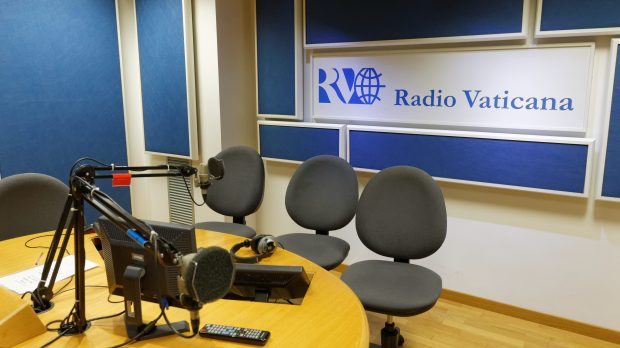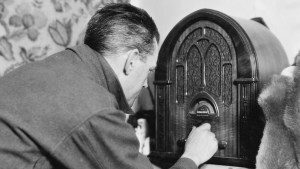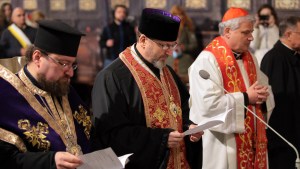As of Monday, March 21, 2022, the pope’s radio will offer new broadcasting slots in Ukrainian and Russian. Twenty-minute programs in each of these languages will be broadcast every morning to support local populations. This approach is part of the long history of Vatican Radio’s service to Christians affected by war or persecution.
“The aim of this approach is to offer help to those who are suffering,” Massimiliano Menichetti, head of Vatican Radio – Vatican News, told I.MEDIA . He specifies that these transmissions will mix religious, liturgical and information programs, which will originate from the work provided by teams on the ground.
Several journalists from Vatican Radio’s Italian, French, Czech and Romanian programs have been sent to neighboring countries in recent days to reach out to Ukrainian refugees. “It is a beautiful Church experience. We are sent to local communities to tell stories, to give voice to people in distress,” says the Italian journalist.
Confirmation of shortwave value
The various digital broadcasting tools, and social networks in particular, have not canceled the more traditional methods forms of radio. Short-wave broadcasts “make it possible to provide long-distance spiritual support, entering homes,” explains Massimiliano Menichetti.
During efforts to reform the Holy See’s communication network, it was proposed that short wave radio transmissions would be reduced. Steps had already been taken towards this goal during the Jesuits’ administration of Vatican Radio, before the creation of the Department for Communication. But this development had raised concerns for populations without access to the internet and for partner radio stations that retransmit part of Vatican Radio’s broadcasts on FM.
The value of this method of dissemination was recently brought to light by the testimony of the Italian priest Pierluigi Maccalli, a former hostage in Niger. After his release, the missionary said he had listened to Vatican Radio in French during his captivity in the Sahara, thanks to short wave broadcasting.
Once mentioned, the idea of limiting Vatican Radio’s short wave broadcasts to the Arabian Peninsula and China, and therefore giving up broadcasts to Africa and Central Europe, was no longer on the table.
The Ukrainian program of Vatican Radio, a tool of consolation in the persecution
Since its origin, Vatican Radio’s Ukrainian program was constituted as a response to the distress of Catholics confronted with war. The first broadcasts in Ukrainian were broadcast on December 14, 1939, in the context of the Soviet occupation of western Ukraine. This predominantly Catholic region was until then part of Poland, dismembered a few months earlier by Hitler’s and Stalin’s troops, within the framework of the German-Soviet Pact.
Questioned by Vatican Radio in Italian during the 75th anniversary of the program , Fr. Taras Kotsur, current manager of the Ukrainian program, explained that Vatican Radio had played a fundamental role for local Catholics during the time of the USSR. The fall of the Berlin wall and the first years of Ukrainian independence made it possible to realize just how many listeners they had. “Our editorial staff received 40,000 letters a year in the early 1990s,” said the Ukrainian cleric.
In 2014, when the war in Ukraine had already begun with the secession of Crimea and Donbass, Fr. Kotsur confided that the forced departure of certain priests from these regions had given Vatican Radio a fundamental role in allowing Catholics who remained in place to maintain a link with the Church.
“We always seek, in our programs, to also transmit the pope’s solidarity, the appeals for peace, and we feel this ‘thank you’ from our people to the Holy See for this attention,” he assured. Words that remain, more than ever, topical in the context of large-scale war now affecting the entire Ukrainian territory.



